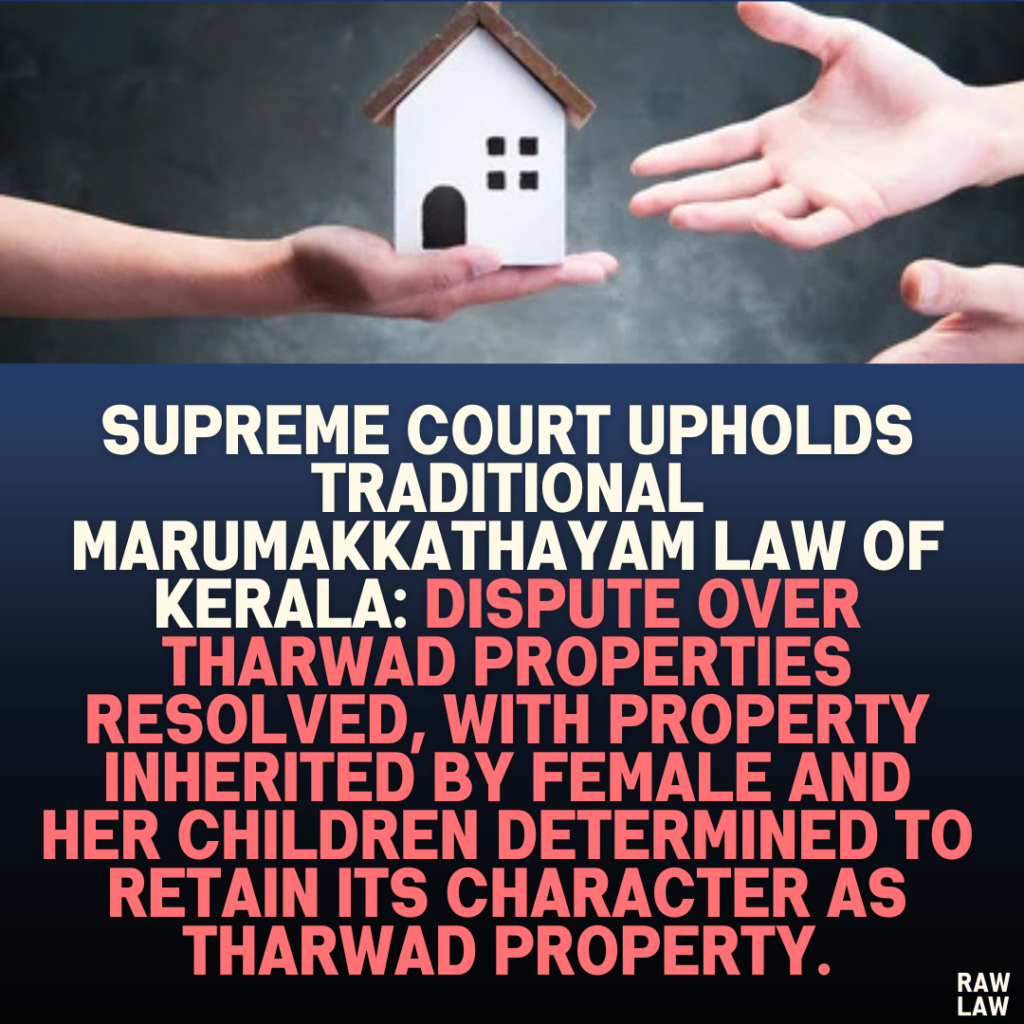Court’s Decision:
The Supreme Court dismissed the appeal, affirming the preliminary decree of the Trial Court, which had been upheld by the High Court. The Court ruled that the scheduled properties in question were tharwad properties under Marumakkathayam law and were to be partitioned accordingly. It also recognized the correctness of the minority view in the Mary Cheriyan case, which held that partition changes the nature of property from joint to individual. This ruling, however, applies prospectively to avoid disturbing prior or ongoing transactions.
Facts:
- The dispute arose over properties governed by the Marumakkathayam law, a matrilineal inheritance system practiced in Kerala.
- The properties under dispute, referred to as Item Nos. 1 and 2, were collectively inherited by the fifth branch of the Andipillil Tharwad, led by Parukutty Amma and her children.
- The plaintiffs filed a suit for partition to divide the properties into 16 shares, asserting tharwad ownership. The defendants, however, contended that the properties were not tharwad properties, arguing instead that they were co-ownership or putravakasam properties.
Issues:
- Whether property inherited by a female and her children after partition retains the character of tharwad property or becomes her separate property.
- Whether Parvathy Amma, under Marumakkathayam law, had the authority to transfer property under Item No. 2 to her daughter-in-law and grandchildren through a mortgage deed.
Petitioner’s Arguments:
- Item No. 1: The petitioners argued that this property was a co-ownership property rather than tharwad property and could not be divided as tharwad property.
- Item No. 2: The petitioners claimed it was putravakasam property (inherited from the father) rather than a tharwad property and thus could not be governed by Marumakkathayam law. They also argued that Parvathy Amma lacked the authority to transfer the entire property.
Respondent’s Arguments:
- The properties were inherited collectively by a natural group, or thavazhi, under Marumakkathayam law, and hence retained tharwad characteristics.
- Any partition or transfer of properties that excluded other members of the thavazhi was invalid.
- The trial court and High Court findings supported the interpretation that the properties were jointly held by the thavazhi and did not belong to any individual exclusively.
Analysis of the Law:
1:
- The Court observed that this property was inherited through a gift deed executed in favor of 11 members of the tharwad.
- Over time, this property was partitioned among nine co-donees, excluding the heirs of two deceased members.
- The Court confirmed tharwad characteristics because the property had been inherited collectively by a natural thavazhi group, which inherently preserves joint ownership under Marumakkathayam law.
2:
- This property was originally owned by Padmanabhan, who died, leaving it to his mother, Parvathy Amma.
- Parvathy Amma executed a mortgage deed in favor of her daughter-in-law, Parukutty Amma, and her grandchildren. The property was held by the thavazhi of Parukutty Amma.
- The Court dismissed claims that the property was putravakasam (paternal property) and ruled it was tharwad property under Marumakkathayam law.
Precedent Analysis:
Mary Cheriyan Case:
- The majority opinion in Mary Cheriyan held that property received by a Nair female through partition retains its tharwad character, even if she is single.
- The minority opinion, favored by the Supreme Court in this case, held that partition changes the nature of ownership to individual property, except when it is inherited collectively by a thavazhi.
- The Court distinguished the current case as involving group inheritance, which retains tharwad characteristics under Marumakkathayam law.
Court’s Reasoning:
- Tharwad Characteristics of Item No. 1:
- The property was inherited collectively by the fifth branch of the Andipillil Tharwad. The collective nature of inheritance by a natural thavazhi group preserves its tharwad characteristics.
- The Court noted that co-ownership claims were unsupported, as no legal challenges were raised against the partition deed that distributed the property among the nine co-donees.
- Thavazhi Ownership of Item No. 2:
- The Court relied on the mortgage deed executed by Parvathy Amma, which explicitly stated that she held the property in her own right and transferred it to her daughter-in-law and her minor children.
- It dismissed claims of individual ownership by the defendants, emphasizing the collective inheritance by the thavazhi of Parukutty Amma.
- Interpretation of Marumakkathayam Law:
- The Court clarified that inheritance by a group, as in this case, preserves tharwad characteristics.
- Partition changes the nature of property to individual ownership only when inherited solely by an individual.
Conclusion:
- The properties under Item Nos. 1 and 2 were declared tharwad properties inherited collectively by the fifth branch under Marumakkathayam law.
- The minority view in Mary Cheriyan was declared correct, holding that partition alters the nature of property for individuals but not for groups.
- The Court dismissed the appeal, affirming the findings of the Trial Court and High Court, and directed the Trial Court to proceed further per law.
Implications:
- The judgment reinforces the importance of collective inheritance under Marumakkathayam law, emphasizing that properties inherited by a thavazhi retain their tharwad characteristics.
- By prospectively applying the minority view in Mary Cheriyan, the Court ensures that the interpretation of the law aligns with evolving family structures while preserving the integrity of past transactions.
- This judgment clarifies the distinction between individual and collective inheritance, providing clearer guidelines for future disputes under Marumakkathayam law.
